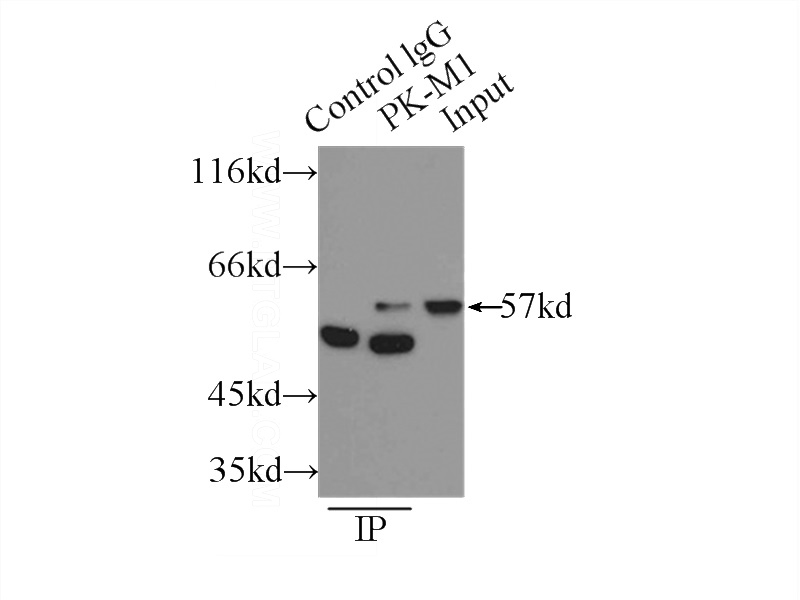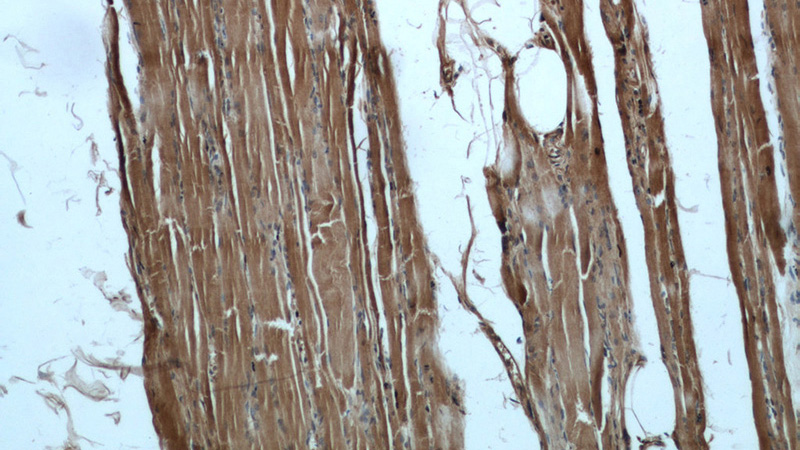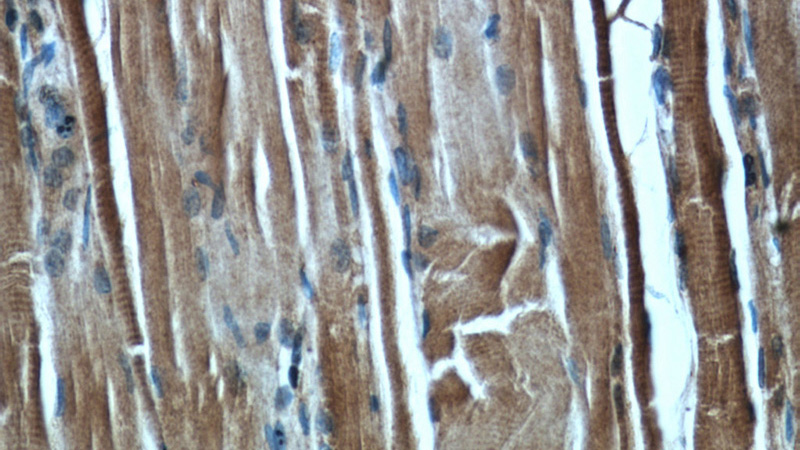-
Product Name
PKM1-specific antibody
- Documents
-
Description
PKM1-specific Rabbit Polyclonal antibody. Positive IHC detected in human skeletal muscle tissue, human brain tissue, human heart tissue. Positive IF detected in HeLa cells. Positive IP detected in mouse brain tissue. Positive WB detected in mouse skeletal muscle tissue, 293 cell, HepG2/MCF7 cells, mouse brain tissue, mouse heart tissue, mouse muscle/liver tissues, mouse skeletal muscle, rat skeletal muscle tissue. Observed molecular weight by Western-blot: 58 kDa
-
Tested applications
ELISA, WB, IHC, IP, IF
-
Species reactivity
Human, Mouse, Rat; other species not tested.
-
Alternative names
CTHBP antibody; OIP 3 antibody; OIP3 antibody; Opa interacting protein 3 antibody; p58 antibody; PK2 antibody; PK3 antibody; PKM antibody; PKM1 antibody; PK-M1 antibody; PKM1 pyruvate kinase antibody; muscle antibody; Pyruvate kinase 2/3 antibody; Pyruvate kinase isozymes M1/M2 antibody; Pyruvate kinase muscle isozyme antibody; TCB antibody; THBP1 antibody; Tumor M2 PK antibody
-
Isotype
Rabbit IgG
-
Preparation
This antibody was obtained by immunization of Peptide (Accession Number: NM_182470). Purification method: Antigen affinity purified.
-
Clonality
Polyclonal
-
Formulation
PBS with 0.02% sodium azide and 50% glycerol pH 7.3.
-
Storage instructions
Store at -20℃. DO NOT ALIQUOT
-
Applications
Recommended Dilution:
WB: 1:500-1:5000
IP: 1:500-1:5000
IHC: 1:20-1:200
IF: 1:20-1:200
-
Validations

mouse skeletal muscle tissue were subjected to SDS PAGE followed by western blot with Catalog No:113860(PK-M1-specific antibody) at dilution of 1:1500

IP Result of anti-PK-M1-specific (IP:Catalog No:113860, 3ug; Detection:Catalog No:113860 1:1000) with mouse brain tissue lysate 4000ug.

Immunohistochemical of paraffin-embedded human skeletal muscle using Catalog No:113860(PK-M1-specific antibody) at dilution of 1:100 (under 10x lens)

Immunohistochemical of paraffin-embedded human skeletal muscle using Catalog No:113860(PK-M1-specific antibody) at dilution of 1:100 (under 40x lens)

Immunofluorescent analysis of HeLa cells using Catalog No:113860(PK-M1-specific Antibody) at dilution of 1:50 and Rhodamine-Goat anti-Rabbit IgG
-
Background
PKM2, also named as OIP3, PK2, PK3, PKM, p58, THBP1, CTHBP and Tumor M2-PK, belongs to the pyruvate kinase family. It is glycolytic enzyme that catalyzes the transfer of a phosphoryl group from phosphoenolpyruvate (PEP) to ADP, generating ATP. It stimulates POU5F1-mediated transcriptional activation. PKM2 plays a general role in caspase independent cell death of tumor cells. PKM2, Pyruvate kinase isozymes M1/M2, has 2 isoforms .The immunogen of this antibody is M1 isoform, also called PKM1. By the upstream metabolite fructose-1,6-bisphosphate, PKM1 is a constitutively active enzyme.The primary pyruvate kinase isoform before tumour development is PK-M1; however, the primary isoform from four independent tumours is PK-M2.(PMID:18337823) This antibody is specific to PKM1 isoform.
-
References
- Nakatsu D, Horiuchi Y, Kano F. L-cysteine reversibly inhibits glucose-induced biphasic insulin secretion and ATP production by inactivating PKM2. Proceedings of the National Academy of Sciences of the United States of America. 112(10):E1067-76. 2015.
- Konno M, Koseki J, Kawamoto K. Embryonic MicroRNA-369 Controls Metabolic Splicing Factors and Urges Cellular Reprograming. PloS one. 10(7):e0132789. 2015.
- Santi A, Caselli A, Ranaldi F. Cancer associated fibroblasts transfer lipids and proteins to cancer cells through cargo vesicles supporting tumor growth. Biochimica et biophysica acta. 1853(12):3211-23. 2015.
- J Casson R, P M Wood J, Han G, Kittipassorn T, J Peet D, Chidlow G. M-Type Pyruvate Kinase Isoforms and Lactate Dehydrogenase A in the Mammalian Retina: Metabolic Implications. Investigative ophthalmology & visual science. 57(1):66-80. 2016.
- Mukherjee J, Ohba S, See WL, Phillips JJ, Molinaro AM, Pieper RO. PKM2 uses control of HuR localization to regulate p27 and cell cycle progression in human glioblastoma cells. International journal of cancer. Journal international du cancer. 2016.
- Martinez-Outschoorn UE, Balliet RM, Rivadeneira DB. Oxidative stress in cancer associated fibroblasts drives tumor-stroma co-evolution: A new paradigm for understanding tumor metabolism, the field effect and genomic instability in cancer cells. Cell cycle (Georgetown, Tex.). 9(16):3256-76. 2010.
- Chiavarina B, Whitaker-Menezes D, Martinez-Outschoorn UE. Pyruvate kinase expression (PKM1 and PKM2) in cancer-associated fibroblasts drives stromal nutrient production and tumor growth. Cancer biology & therapy. 12(12):1101-13. 2011.
- Wang Z, Jeon HY, Rigo F, Bennett CF, Krainer AR. Manipulation of PK-M mutually exclusive alternative splicing by antisense oligonucleotides. Open biology. 2(10):120133. 2012.
Related Products / Services
Please note: All products are "FOR RESEARCH USE ONLY AND ARE NOT INTENDED FOR DIAGNOSTIC OR THERAPEUTIC USE"
